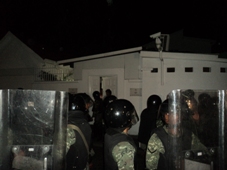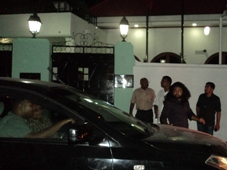The ‘December 23 alliance’ of eight political parties and a coalition of NGOs met Vice President Dr Mohamed Waheed Hassan at his official residence, Hilaaleege, at 1:00am last night, pledging allegiance and urging him to assume control of the executive.
The meeting followed the 14th consecutive night of opposition-led protests against the government’s ongoing detention of Chief Judge of the Criminal Court, Abdulla Mohamed, after the judicial watchdog obeyed a Civil Court injunction to halt its investigation of the judge.
Last night’s protest started outside Reefside on Orchid Magu, during which protesters reportedly threw black ink at riot police.
Police pushed back the crowd around 10:15pm, dividing them up in the process, but the protest continued in the area and protesters were seen eating rice pudding. An MNBC One cameraman was reportedly hit on the head and was rushed to hospital in a police ambulance.
The steering committee of the protests then gathered for a meeting at the Dhivehi Rayithunge Party (DRP) office around 11.15pm. The meeting was attended by Progressive Party of the Maldives (PPM) Deputy Leader Umar Naseer, Dhivehi Rayyithunge Party (DRP) Deputy Leader Ahmed Mohamed, Dhivehi Qaumee Party (DQP) Secretary General Abdulla Ameen, Adhaalath Party President Sheikh Imran Abdulla, Jumhooree Party (JP) Secretary General Fuad Gasim, NGO coalition chairman Sheikh Ibrahim Didi and a representative of Dr Waheed’s Gaumee Ihthihaad Party (GIP).
The party leaders emerged from the DRP office around 12.45am and headed towards the VP’s official residence, next door to the Justice building. Opposition supporters were gathered in the area when they arrived.
 Maldives National Defence Force (MNDF) officers with shields soon arrived and cordoned off the area. At 1:40am officers entered the Vice President’s residence through the back door and a few minutes later Naseer and the rest of the party leaders came out of the building.
Maldives National Defence Force (MNDF) officers with shields soon arrived and cordoned off the area. At 1:40am officers entered the Vice President’s residence through the back door and a few minutes later Naseer and the rest of the party leaders came out of the building.
They then headed to the Jumhooree Party (JP) office for a press conference. A team of MNBC reporters were refused entry.
According to local media, the opposition leaders asked for a meeting with the Vice President because of the government’s “destruction” of the judiciary and “the President’s declaration that he would not hold the 2013 presidential election.”
An audio clip of President Mohamed Nasheed vowing to ensure a fair judiciary before the 2013 presidential election was leaked to local media yesterday.
In the recording Nasheed is heard to say: “Freedom of expression and an independent and fair judiciary in this country – I will not go for the election after these five years without doing these two things.”
Several local media outlets reported the comment as a threat from the President not to hold elections unless the judiciary was reformed. The President’s Office yesterday said the statement was a promising to reform the judiciary before the conclusion of the President’s first term in office: “He has no intention of calling off any elections.”
After last night’s meeting in Hilaaleege, Umar Naseer said all the parties in the opposition alliance have agreed to “pledge support to the Vice President.”
Speaking to DhiTV after the meeting, Naseer said the members of the alliance decided to meet the VP to discuss the current situation.
“After these discussions we are now calling upon the nation’s security forces, on behalf of our ‘December 23 alliance’ of all the opposition parties in the country as well as the NGO coalition, to immediately pledge their allegiance to the VP,” Naseer said.
“I repeat, all members of the December 23 alliance are now calling on the security forces to immediately pledge allegiance to Vice President Dr Mohamed Waheed Hassan Manik and, as Mohamed Nasheed has violated the constitution, to not obey any of his orders and to pledge allegiance to the Vice President.”
Dr Waheed had assured the party leaders he would “take any legal responsibility he had to within the bounds of the law”, Naseer stated, and was “ready to take over the duties specified in the constitution.”
The stand of the ‘December 23 alliance’ was that President Mohamed Nasheed has “lost his legal status”, DhiTV reported.
President Mohamed Nasheed’s Press Secretary Mohamed Zuhair told Minivan News today that the Vice President “has not said anything to cause a loss of confidence in him by the government. He was very careful in his statement, which was that he would undertake his duties as stipulated in the Constitution. Had the protesters gone to meet with [Fisheries Minister] Dr Ibrahim Didi or [MDP MP] Reeko Moosa they would have said the same thing.”
The protesters claimed to represent 13 political parties and 21 NGOs, Zuhair said, “but all the rallies have seen the involvement of no more than 300-400 people. It is very disproportionate.”
“I think the protests are slowing down and now they are trying to save face – pledging allegiance to the Vice President is the same as pledging allegiance to the government. The VP is working in cabinet today – there is no rift. This is a non-story,” he maintained.
The government was not concerned about Dr Waheed’s late night meeting with opposition leaders, as letting the protesters into his house “was the polite thing to do,” Zuhair said.
He also dismissed opposition claims that there was anti-government sentiment brewing in the security forces.
“The security forces have shown themselves to be a disciplined and absolutely professional force loyal to he government. There is no cause for any concern,” Zuhair said.
Legally, President Nasheed can only be impeached with a two-thirds (51) majority in the 77 member parliament. The combined opposition parties can marshal 36 members to the MDP’s 35 – without considering the six independents – so a decision to impeach would require the unlikely cooperation of at least nine ruling party MPs.
Dr Waheed was not responding to calls at time of press. However in a blog post on January 21 regarding the government’s detention of Abdulla Mohamed, he said he was “ashamed and totally devastated by the fact that this is happening in a government in which I am the elected the Vice President.”
He subsequently gave a press conference in which he requested the Judicial Service Commission (JSC) suspend Criminal Court Judge Abdulla Mohamed from the bench while complaints against him remain outstanding, “because as you can see [keeping him on the bench during questioning] has created more disruption than we all had bargained for.”
The JSC this week told parliament that it is unable to take action against the judge after he filed an injunction in the Civil Court halting the investigation.
Aishath Velezinee, former president’s member at the JSC, argues that “if the judicial watchdog can be overruled by a judge sitting in some court somewhere, then the JSC is dysfunctional. But that’s what has been happening,” she asserted.
 (0)Dislikes
(0)Dislikes (0)
(0)